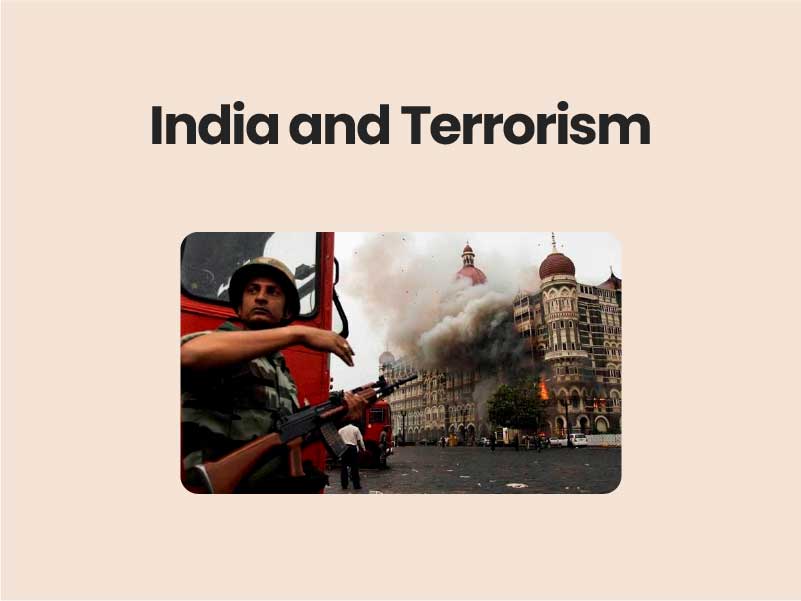Companion@360 → 7 Month programme to sharpen your writing skills → REGISTER NOW

Terrorism (UN Definition)
Terrorism – “Criminal acts intended or calculated to provoke a state of terror in the general public, a group of persons or particular persons for particular purpose are in any circumstance unjustifiable, whatever the considerations of a political, philosophical, ideological, racial, ethnic, religious or any other nature that may be invoked to justify them”.
Terror is not a new phenomenon to India and has been a growing concern since Independence.
India currently faces different types of terrorism, includes:
- Externally sponsored terrorism
- Hinterland terrorism
- Urban terrorism
- Leftwing extremism
- Northeast insurgency
- Religious terrorism
- Cyber
- Nuclear
Externally sponsored terrorism:
Terrorism sponsored by external actors for disrupting the peace of the Nation, it dates back to 1947 and still continues. Eg:
- Pakistan intelligence backed the Khalistan movement in Punjab.
- The insurgency movements in J&K was directly funded and trained by the intelligence of Pakistan.
On the Eastern borders,
- China has been involved with the northeast insurgency groups like the ULFA, PLA, UNLF etc. aiming the separation of the northeast from India.
Hinterland terrorism:
It refers to terrorism in the interior areas which are usually away from the coast. These areas are often disadvantaged compared to other regions in terms of development. Eg: insurgency in the Naxal-hit areas.
Urban terrorism:
Urban terrorism is the targeted use of terrorism in urban populations in order to cause the most harm, injury, death, or property damage. Since urban areas have significantly higher population densities than rural areas, targeting those areas can maximize the effect of the terrorist attack.
Eg: The wave of terrorism witnessed in Punjab, it was unleashed in cities like Amritsar, Jalandhar etc.
Leftwing extremism:
It is an ongoing conflict between Maoist groups, known as Naxalites or Naxals, and the Indian Government. Deprivation, land alienation and exploitation of the underprivileged and the tribals have repeatedly been the reason for a popular uprising in the country even prior to independence.
Religious terrorism:
Religious terrorism in India includes acts of violence by followers of one religious group against followers and institutions of another religious group, often in the form of rioting.
Eg: Radical Islamic groups, Hindu right-wing extremism, Sikh militancy etc.
Cyber terrorism:
A criminal act perpetrated by the use of computers and telecommunication capabilities resulting in violence, destruction and/or disruption of services to create fear within a given population with a goal of influencing a government or population to conform to a particular political, social or ideological agenda.
“ According to the U.S. Federal Bureau of Investigation, “ Cyber terrorism is any premeditated, politically motivated attack against information, computer systems, computer programs, and data which results in violence against non-combatant targets by subnational groups or clandestine agents.”
Read Also Terrorism Financing
Nuclear terrorism:
Nuclear terrorism is an offence committed if a person unlawfully and intentionally uses any way radioactive material with an intention to cause death or serious bodily injury, or with the internet to cause substantial damage to property or to the environment.
Reasons for the spread
- Under development, alienation, exploitation, discrimination led to discontent among certain section of people.
- Regional disparity.
- Easy use of technology such as mobile phones, computer, pager etc in the encrypted mechanism for the conduct of terrorism.
- Targets of terrorism are not concentrated on a particular place such as religious location but rather it is more widespread (financial, commercial, tourist or software centres) in order to catch more attention at national and international level.
- Use of social media and communication to radicalize and recruit young people for conducting acts of terrorism.
- Competition for scarce resources and intolerance among the population.
- Some countries support terrorist groups and internationally recognize them as freedom fighters. The terrorist of one country is considered a freedom fighter for another country.
- The link between terrorism and organized crime to earn easy money and smuggling.
Sources of terrorism financing
It is believed that the terrorist are financially supported through various ways:-
- Donation from Islamic countries in the name of Jihad.
- Earnings from drug trafficking.
- Issuing fake currency notes.
- Organized crime.
- Hawala transactions.
- Extortion and taxation
Read Also The Financial Action Task Force (FATF)
Strategies adopted by India
Agencies fighting terror
- NIA: A central government investigative agency to probe terror attacks in the country, created by an Act of the Parliament of India on December 31, 2008, following the Mumbai Terror Attack of November 2008.
- Intelligence agencies: There are a set of agencies responsible for fighting terrorism in India. A major agency utilized for gathering cross-border information is the Research and Analysis Wing (RAW)- the external intelligence agency. The Intelligence Bureau (IB), a division of the Home Affairs ministry is responsible for collecting intelligence information inside India.
- NATGRID: National Intelligence Grid is an intelligence grid interconnecting certain agencies of the government of India to collect and share intelligence that could be used by the intelligence agencies of various departments.
- Multi-Agency Centre (MAC): it is for counterterrorism whose mandate is to share terrorism-related intelligence inputs on a day to day basis.
- Armed forces: it directly deals with the terrorism and insurgency problems in J&K and in north-east parts of the country.
- Creation of four new NSG hubs: the inadequate security forces was addressed by opening four new NSG hubs at Mumbai, Kolkata, Chennai and Hyderabad.
- Police force: The police is the first to respond to a terrorist attack in our country. They take over the situation until the designated special encounter terrorist forces reach the spot.
- CAPF: Centre Armed Police Forces are used extensively in Maoist areas, Kashmir and North-East.
Legal mechanism
- TADA 1985: TADA was the first anti-terrorism law enacted in India and it was repealed in 1995 due to its misuse. The law placed a restriction on granting bails and gave enhanced power for the detention of suspects and attaching the properties of the accused. Exclusive courts were also set up to hear the cases under the act.
- POTA 2002: It was enacted in the wake of India Airlines flight hijack in 1999 and Parliament attack in 2001. Under this act, a suspect can be detained up to 180 days by a special court. This was repealed in 2004.
- UAPA 1967: Under this act, the definition of ‘Terrorist Act’ has been expanded to include offences that threaten economic security, counterfeiting Indian currency and procurement of weapons etc. As of now under section 35 of UAPA, there are 39 groups in the list of banned terrorist organization.
- NIA 2008: It plays the role of a national counter-terrorism law enforcement agency.
- Arms act 1959: Laws relating to curbing illegal weapons.
- AFSPA 1958: Armed Forces Special Power Act.
- PMLA 2002: Prevention of Money Laundering Act.
Read Also The Nuclear Suppliers Group (NSG)
India and Terrorism – Way forward
- Maintain close and effective coordination between intelligence and security agencies at the centre and state level.
- Keep a close watch to identify the potential ISIS or terrorist recruits and take further action such as de-radicalisation strategy.
- Empower Central Armed Police Forces (CAPF) to deal with internal security challenges.
- Impose tight control over immigration.
- Upgrade intelligence setup.
- Strengthening of coastal security.
- Appropriate and effective implementation of FATF standards.
- Identify and take measures in relation to any countries with strategic deficiencies for terrorist financing.
- Promote more effective domestic coordination and international cooperation to combat the financing of terrorism.
Daily FREE Prelims Test Join

